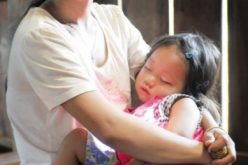
The U.N. reports that thousands of boys and girls are taken from the less-developed northern villages of Ghana to provide cheap labor in the south. OM Ghana focuses strongly on helping children and youth. (OM News)
“It was raining the evening I met Annabelle,” relates Chris Insaidoo of Operation Mobilization Ghana. “She approached my car and asked, ‘Do you want me for the night?’ I felt so very sad.
“‘Why are you doing this to yourself, my sister?’ I asked, looking into the girl’s dark eyes. ‘You have a bright future. Why must you be here this night, in this rain, selling your body?’
“‘It’s a long story, sir,’ she whispered, her eyes overflowing with tears. ‘Sorry, I cannot say anything more. They are watching me.’
“I gave the girl my phone number and told her to call. That was the beginning of what led to the rescue of some 46 sex slaves from Nigeria in October.”
It is no secret that Nigeria’s organized crime rings have created a multi-billion-Euro human-trafficking network worldwide. Over the last 10 years, bosses have transported tens of thousands of women and children to other parts of Africa and overseas for the purposes of forced labour and prostitution.
The young women that Chris learned about, all between the ages of 17 and 25, had been taken to a “guesthouse” in the unofficial red light district of Kumasi, Ghana, with the promise of jobs. Once they arrived the girls were informed they would be working as prostitutes, and they could only buy their freedom by paying off the equivalent of 1,400 Euros ($1,840 U.S.). Each of them was then forced to put on the cheap, revealing clothing they were given, and go out to solicit customers.
Often the women were paid as little as 2 Euros for their services, and not infrequently they were raped, individually or by gangs, or else robbed. One girl named Angela later told Chris that she sometimes had to sleep with up to 12 men each night to make the required amount to cover food and rent.
“You can’t fall sick, and it was taboo to get pregnant,” she added. “Our madams would beat you mercilessly and send you out to sleep with men until they acquired a concoction for you to drink. Three days after the abortion you needed to be back in business.”
Chris Insaidoo, who founded Rural Evangelism Crusaders, which became OM Ghana in 2010, has been involved in fighting the trafficking of children and girls for the last six years. Chris felt compelled to take action after learning the plight of hundreds of boys and girls who are taken from poor areas of northern Ghana and forced into slave labor.
Many children are used for farming or for fishing on Lake Volta, one of the world’s largest artificial lakes. Their job includes diving to disentangle fish nets from the numerous tree stumps under the lake—dangerous work that can result in water-based diseases, or even drowning. Last year alone, the OM Ghana team were able to send 150 rescued children or kids at risk of trafficking to school.
After Chris’ encounter with Annabelle, the team worked to gather information from other trafficked Nigerian girls on the street. It was risky business, particularly as they observed some of the local police cooperating with traffickers.
“But feeling that these girls needed justice,” he states, “we went to the police commander. He directed us to the Anti-Human Trafficking Unit of the Ashanti Regional Police, and through information from two girls to our OM team they initiated a raid on the brothel. Four traffickers were arrested and 46 girls set free.”
Chris explains, however, that rescuing people is a costly business. Victims are often left feeling cheated, shamed and afraid, with no place to go.
“In order to keep their power over victims, traffickers sometimes leak information to the girls’ families that they have become prostitutes, so they can’t go home again. Traffickers also perform witchcraft ceremonies with their hair or blood, convincing them that a family member will go mad or die if they disobey their captors.
“So,” he says, “we have to run deliverance sessions. It’s hard work, but people who are rescued will go back to slavery without Christ. You must meet their spiritual needs as well as physical needs. I’ve met some of the girls we rescued back in Nigeria, having a tough time. So we try to link them with churches.”
Chris is deeply concerned, however, about the vulnerability of young people who have not been educated about trafficking, and those who have no way to earn an adequate income. OM Ghana’s awareness programme and skills training in rural communities is meant to address the first problem. A Hope for Mothers ministry also tries to raise support for single mothers, not just those who are trafficked.
“We’ve set up a small sewing centre where women make uniforms so that kids can go to school,” he says. “This helps both the women and children, and Freedom Climb* money buys the fabric. We are also starting a vocational skill development training this May with about 20 to 25 girls. These girls will be learning fashion (sewing), catering and hairdressing for one and half years. At the same time they will have the chance to learn other skills like soap making, mushroom farming, batik, basic health first aid, English and basic maths. Of course, they will also be discipled and grounded in their faith. We have received some funding from the Freedom Climb and OM UK for this project.”
Still, the amount that OM can do is limited by a lack of resources. Chris’ team has only four full-timers and 24 part-time volunteers. His wife works and he himself accepts part-time employment in order to fund some of the different ministries and people who are staying with them.
Of the 46 girls liberated last October, 12 were taken to OM Ghana’s base for counseling, rehabilitation and discipling. They have now been sent back to their families and most have made a fresh start. While we can rejoice at the redemption of young women like Annabelle and Angela, the reality is that hundreds of thousands of others remain prisoners of the powerful. Our work, worldwide, has just begun.
Debbie Meroff/Operation Mobilization










